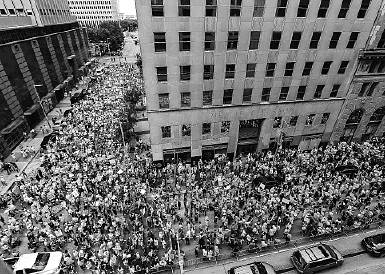LETTERS
Immigration practices
Protests
Regarding “Faith-based groups turn up the heat on ICE” (Page F3, Sunday), it was very gratifying to read the article that highlighted the response of both the Unitarian Universalist Association and the American Friends Service Committee to the inhumane abuses of ICE. It was particularly so given the opinion piece in the same section by Robert Zaretsky asking, “Why are Texas pastors staying silent about refugees?” which criticized some of Houston’s “most prominent Protestant authorities who have not uttered a word.” I also applaud the coverage of Saturday’s nationwide protests against the horrific practice of separating asylum-seeking parents from their children.
Unitarian Universalists from around the metropolitan area attended the Houston City Hall rally as did many other progressive people of faith. Indeed, UUs and other progressive people of faith have been taking public action to support immigration justice for years because the current U.S. immigration system violates the core beliefs of many religious traditions — the inherent worth and dignity of every person and the imperative for a compassionate response to injustice. Those beliefs are epitomized by the story of the Good Samaritan which Zaretsky would have those who remain silent re-read. The question, “And who is our neighbor?” is just as urgent as it was 75 years ago.
Rev. Dr. Becky
Edmiston-Lange, senior minister, Emerson Unitarian Universalist Church, Houston
Loyal neighbor and friend
Regarding “O Canada” letter (Page A13, Tuesday), the writer claims that we need nothing from Canada. Perhaps so, but we should not forget its loyalty to the United States after 9/11.
As we sought revenge against the Taliban in Afghanistan, Canada was one of many countries that joined us. Over the next 14 years, 40,000 Canadian Armed Forces members served in Afghanistan, and 158 lost their lives. But, now we have a president who only looks at dollars as a measure of determining to whom we owe loyalty. You may run a business that way, but it’s no way to run a country.
Bob Jolly, Houston
Civility and protests
Regarding “Dedication to ‘civility’ can’t be basis for quashing protests” (Page A17, Wednesday), William Chafe is not quite right in his op-ed regarding civil disobedience to obtain civil rights. As a military veteran who upheld his oath to protect and defend the Constitution of the United States, I would offer instead the following example:
Suppose a neighbor of mine dislikes something that I do, did or said. If that neighbor were to write on a placard, “My neighbor is a jerk,” Iwould offer them cold water during the day and ice cream at midafternoon should they decide to parade on the side walk in front of my house. I would welcome the exercising of their constitutional rights. However, I would have them arrested if they piddled in my petunias, blocked my driveway, stole or vandalized my mail or walked on to my property for the purpose of harassment.
Chafe seems to be of the Berkeley, Calif. culture whereby if one declares oneself the holder of truth, right and morality, then no one has any rights but them. There is a fine line between justifiable protest — i.e. sit-ins, and harassment. Protesters should always be welcome to demonstrate peaceably in front of the White House, but they have no right to invite themselves to dinner.
James A. Babb, Friendswood
Non-violent direct action
William Chafe is inviting us to engage in a crucial civics discussion about what Dr. Martin Luther King Jr. famously defined as the tension and the crisis of non-violent direct action.
After we had read Chafe's piece, my wife and I looked up and reviewed Dr. Martin Luther King's “Letter from Birmingham Jail.” His emotional description of his children's experience growing up reminded my wife that when she was five years old she would often ask her mother, “Why can't Effie” — her best friend and nanny — “sit with me on the bus?” Her mother's oft repeated response: “It's not right, but that's how things are.”
Like Chafe, Dr. King explains that civil society must eventually take direct action to ever effectively change “how things are.” As King defines it, “Nonviolent direct action seeks to create such a crisis and foster such a tension that a community which has constantly refused to negotiate is forced to confront the issue. It seeks so to dramatize the issue that it can no longer be ignored.” And, as Chafe points out, Frederick Douglass, too, understood the necessity for a dramatic nonviolent crisis. Thus, many voices have long been encouraging Americans to exercise nonviolent direct action — marching, debating, speaking, publishing and demonstrating — and to trust in the beneficial tension it creates.
Robert Forker, Houston
Forward thinking
Regarding “A soggy Fourth ends with a bang” (Page A1, Thursday), perhaps it is time to reconsider Eleanor Tinsley Park and the stretch of Buffalo Bayou running from downtown to South Shepherd as the site of the Freedom Over Texas celebration.
The Cotswald Project, proposed about 15 years ago, suggested converting this space into Houston’s version of a River-walk. It seems to be sheer folly to continually spend millions of dollars repairing flood damage to this area, restoring a park only to wait for the next flood’s destruction. A gorgeous lake, with accompanying amenities would be a great addition to this area as well as acting as an additional flood control device for the city.
Al Marcus, Houston
